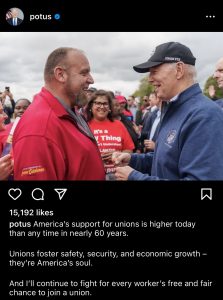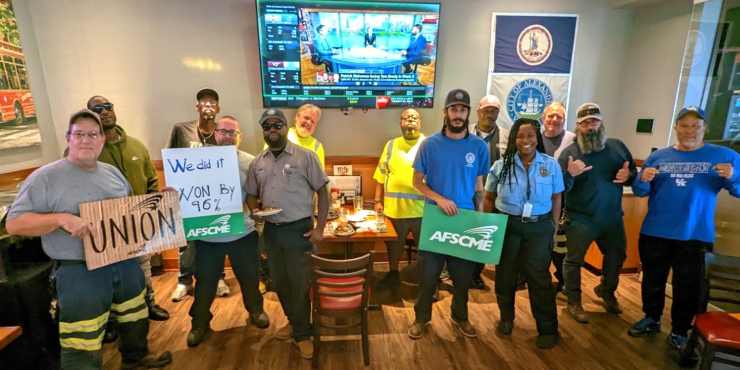Labor and trades workers in both Arlington and Alexandria recently ratified union contracts, the first since a new collective bargaining law passed in Virginia that paved the way for public employee union negotiations.
The Arlington County government recognized the American Federation of State, County and Municipal Employees (AFSCME) as the representative of its labor and trades employees in September 2022. The two sides then negotiated through 2023 until the end of October, when these employees ratified their contract.
Alexandria labor and trades workers voted to form the union in September 2022 as well, and negotiated until the beginning of October 2023. Union members ratified that contract Oct. 4.

The contracts in Arlington and Alexandria are the first two ratified since former Gov. Ralph Northam signed a new collective bargaining law in 2020 that took effect in May 2021, allowing counties, cities, and towns to recognize labor unions or other employee associations as bargaining agents for public officers and employees. The law also permits collective bargaining contracts between the union and employers.
The law reverses a 1977 Virginia Supreme Court decision saying Arlington County Board policies permitting collective bargaining were invalid. That ruling also prevented the local government from recognizing labor unions that represented city employees.
The two contracts secured wage increases for three years for both Arlington and Alexandria labor and trades employees, including water treatment workers, traffic enforcement, parks and recreation workers, and Arlington County department of environmental services workers.
According to Anthony Pistone, president of AFSCME Local 3001 and an employee with Arlington County water, sewer and streets, the public can expect to see a more efficient and unified workforce in the next several months.
Arlington AFSCME union members will receive a 4.75% wage increase during the first year of the contract on July 1, 2024, a 4% wage increase the second year and a 3.5% wage increase the third year.
Alexandria members negotiated a 2.5% wage increase for each of the three years with a $1,000 2024 bonus.
Pistone said workers received raises before the union was even recognized because the governments realized the union was coming.
“I don’t want to frame it like it’s union busting,” Pistone said. “It’s just they figured they better come up with some more cost of living before we sat down the contract.”
Pistone said the wage increases are great, but labor management committees are the best benefit of the contract. Pistone said these committees allow members to voice their concerns in meetings with management.
“We will be able to get information and put our input into what’s going on in certain areas,” Pistone said. “Like healthcare, timing, career ladders and stuff like that.”
He said this is unique to the AFSCME union in Arlington and Alexandria.
“No other union has this,” Pistone said. “The reason why we did it this way is because the laws and the labor agreements for Virginia are so different than they are for D.C.and Maryland and places like that.”
Pistone said these laws prevent employees from giving their input on topics such as scheduling and what kind of work employees perform.
“There would be no way that we could actually negotiate about some of these things because it’s basically against the law in Virginia,” Pistone said.
Robert Combs, a labor and employment legal analyst for Bloomberg Law, said laws like this are “standard responsible government procedures.”
“They’re going to want to make sure that their workers aren’t being taken advantage of and aren’t being left behind,” Combs said. “It seems, to me, pretty likely that there are some laws in place that might hinder what an individual union contract in the public sector in Virginia can and can’t do.”
AFSCME is a public-sector union, meaning that members had to negotiate with local government authorities to ratify their contracts.
Combs said public-sector unions are gaining more members than private-sector unions.
“There’s been a definite trend downward,” Combs said. “The one workplace where the trend has been upward, well at least it hasn’t gone that far down, is government employees. So, in the private sector, membership in the building trades has gone down. But it stayed pretty constant in government employment.”

Arlington resident Michael Cantwell said he is somewhat opposed to public-sector unions. He said he thinks they contribute to local government corruption.
“They also inhibit the implementation of, what many believe, including myself, much needed reforms in policing and firefighting and teaching,” Cantwell said. “Local politicians are not only just getting money, but also their feet on the ground for their campaigns. Most local labor unions support democratic candidates, so they’ll turn around and they will support the local candidate and then it just goes around and around.”
Cantwell said unions protect employees from termination, even if they do not deserve protection.
“Many times unions will protect poor performers or outright criminal behavior,” Cantwell said.
Cantwell advocates for a program that he says will make leaf collection in Arlington more efficient and effective by outsourcing the process to other businesses, instead of employing Arlington county workers to take care of the leaf, litter to mulch process.
“I could see a county trades employee say, oh no, no, no we don’t want to eliminate any jobs,” Cantwell said. “So even though what I’m describing, I think would be much more efficient and effective, saving county money, saving taxpayers money. I could see a union resisting that improvement.”
Combs said because of outsourcing, there are fewer private manufacturing sites in the United States.
“Government workers, regardless of where they work, whether in offices or whether it be building trades like this, or police or schools, they’ve stayed pretty constant in their union membership, as opposed to private sector,” Combs said.
Susan Carle, professor of Law at American University’s Washington College of Law, said these union contracts will protect both Arlington and Alexandria employers and employees.
“So the default rule in the United States for terminating an employee is that an employer can do it for any reason at all,” Carle said.
This is called “at-will” employment.
“The employer can wake up one day and say, I don’t like the way you look, I don’t like your face, I’m going to fire you,” Carle said. “There’s no recourse, unless they’re discriminating on the basis of a protected characteristic, which is basically race, sex, national origin, age, religion and disability.”
“When you bring in a labor union, you no longer have ‘at-will’ employment,” Carle said. “That’s one very important protection.”















Add comment